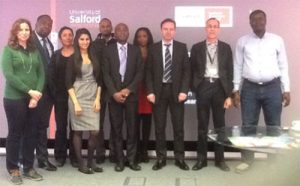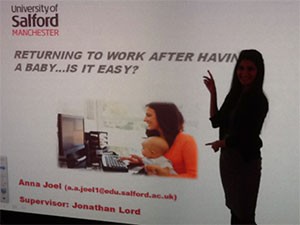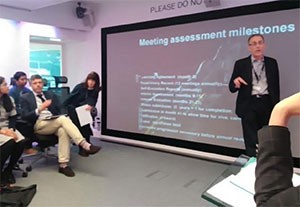 At Salford Business School, we have a thriving PhD community from a range of fascinating business, management and law students from around the world.
At Salford Business School, we have a thriving PhD community from a range of fascinating business, management and law students from around the world.
A great example of this community coming together is our recent Doctoral Symposium in the world class facility of the ThinkLab. This showcased some of the superb PhD research projects which are currently being conducted within the School, as well as the high academic calibre of our PhD students.
The Symposium involved twelve doctoral students taking the opportunity to provide 10-minute presentations to other students and supervisory staff about their research. In the process they outlined:

- Why their research topic is important and interesting
- What are the limits and potential of existing literature/work what exactly is their research focus
- What are their research aims and questions; what methodology they are utilising
- What is the broader contribution/generalisation being made.
Given that each presentation was limited to only 10 minutes, it meant they had to be as concise and precise as possible.
Doctoral presentations

There were some fascinating presentations on a variety of topics. Salford Business School’s Director of Postgraduate Research, Professor Ralph Darlington kicked off the event with an exploration of the PGR journey, focusing on the necessary preparation for successful achievement of assessment milestones and progression, and the dynamics of the supervisor-student relationship and the way it can be influenced.
https://www.youtube.com/watch?v=fQJKYnzVHhM
Positive relationship between customers and employees
Monar Nassar, who signalled the major challenge universities face of attracting qualified academic staff who can contribute to giving them a competitive advantage in the changing and volatile world of higher education, gave a presentation on her research project that is utilising Salford Business School as an exploratory case study to examine whether there is a positive relationship between student satisfaction (customers) and academic staff satisfaction (employees).
Removing barriers for women returning to the workplace after child-birth

This was followed by a presentation by Anna Joel on her research into examining Human Resource Management’s role in identifying and removing barriers for women returning to the workplace after child-birth (including lack of flexible working arrangements, inaccessibility of part-time work and work-life conflict), and questioning the implementation and usefulness of current HR policies to support women in these circumstances.
https://www.youtube.com/watch?v=gvTrHZr05Aw
Factors that can affect UK food supply chain ‘resilience’
Next up was Pouria Liravi whose research is focused on investigating influencing factors that can affect UK food supply chain ‘resilience’ (enablers and inhibitors and their interactions) within food manufacturing, with the overall aim of identifying the most influential supply chain vulnerabilities as well as the pertinent organisational capabilities which would enable companies to bounce back in unexpected disruption scenarios.
Additive Manufacturing (AM) “3D Printing”
Konstantinos Chaldoupis’s presentation was on his research into Additive Manufacturing (AM) or (what most people refer to as) “3D Printing”, which allows companies and individuals to “print-out” solid objects layer-by-layer based on access to 3-dimensional computer data. The research is investigating the impact of AM implementation factors on supply chain paradigms.
https://www.youtube.com/watch?v=3HXk9mN1sRE
Digital marketing and football
 Meanwhile, against the backcloth of the Class of ’92 initiative involving ex-Manchester United players who have recently purchased Salford FC Alex Fenton’s research is evaluating the role that digital marketing is playing and its contribution to creating the world’s first digital, ‘always on’ football club.
Meanwhile, against the backcloth of the Class of ’92 initiative involving ex-Manchester United players who have recently purchased Salford FC Alex Fenton’s research is evaluating the role that digital marketing is playing and its contribution to creating the world’s first digital, ‘always on’ football club.
Loyalty card programmes’ effects on consumers within potentially harmful retail experiences
On a totally different theme, loyalty card programmes in recent years have become the overriding tool for marketing worldwide and the proportion of retail organisations engaging in loyalty schemes has risen significantly with some 40 million cards in circulation. Violet Mtonga’s research is critically exploring such loyalty card programmes’ effects on consumers within potentially harmful retail experiences such as the retail gambling industry.
https://www.youtube.com/watch?v=eKzxKrb-GWU
Inter-relationship between networks and service innovation in UK professional services
Valerie Menelec’s research is using multiple case studies to understand the inter-relationship between networks and service innovation in UK professional services, identifying and analysing organisational innovation culture, and the multiple layers of social and intellectual capital within networks and how these interact with and affect service innovation.
Opportunity recognition process of Nigeria’s SMEs
Given that recent reports on Nigeria’s economic and financial institutions have indicated there is an increasing rate of failed Small and Medium Enterprises (SMEs), Moshood Bello’s study seeks to understand the possible role of the opportunity recognition process (which is the foundation of venture creation) of the country’s SMEs, with a view to determining if a relationship exists between this process and their performance.
https://www.youtube.com/watch?v=8fiwvg9wATc
Renewable energy for European Union (EU) countries
On the rather different legal front, Busuyi Obafemi’s study is seeking, in a context where the world’s oil reserves appear to have peaked and are rapidly declining, to establish how renewable energy technologies can be utilised through legal measures to ensure a sustainable and efficient energy policy for European Union (EU) countries.
Cybercrime bill in Nigeria
Meanwhile with cybercriminals in Nigeria continuing to operate to the detriment of the country despite efforts by the government to tackle the problem through the activities of law enforcement agencies, Muktar Bello’s research is exploring whether the adoption of a harmonized and digitized form of investigation, enactment of a cybercrime bill and enhanced international cooperation between relevant stakeholders in Nigeria, could positively affect the activities of investigators and prosecutors in curtailing the menace of cybercriminals in the country.
https://www.youtube.com/watch?v=Dsx3cTcB8YI
Family controlled banks in Nigeria
Management accounting change within family controlled banks within developing countries was the subject matter of Babafemi Ogundele’s presentation, which aims to explore the process of MAS change, diffusion and resistance in the case study FCMB Nigerian bank.
Motivational factors influencing Malawi’s football national team
Charles Kachista’s research investigates what the contributory motivational factors are influencing the Malawi football national team, whose players/staff continue to play with vigour despite experiencing year-on-year inadequacy of resources, and the extent to which such motivational skills could be of wider application in traditional work organisations.
https://www.youtube.com/watch?v=Vr9sMZN83bw
https://vimeo.com/125895951
PhD student feedback
I found the Doctoral Symposium an extremely useful experience in terms of improving your presentation skills and communicating your research area to a wider non-specialist audience, which involved an outstanding number of students and staff in an exceptionally organised environment. Furthermore the received feedback made a constructive impact to further enhance the researchers’ ability to address complex methodological issues and prepare themselves for future conferences.
– Kostas Chaldoupis
The symposium gave me my first opportunity to pull together my research so far in the form of a visual presentation. The feedback beforehand, and after my presentation, was invaluable. I got a great deal of really helpful questions and comments that I was able to write up and reflect on after the event. The event was incredibly well attended with a huge diverse mix of projects, nationalities, ages and topics. The ThinkPod is an excellent space for this kind of event – you can see everyone at a glance and it is clearly designed for the kind of engaging presentations and discussions that happened on the day. I feel much more prepared now for my Internal Assessment and other forthcoming conference presentations.
– Alex Fenton
Initially I was very nervous to take part in the Doctoral Symposium because it was the first time I was going to present my research to a large group of people but once I did it I realised how useful and encouraging it was in terms of confidence building and future progress in research. Overall, it was a very positive experience. I have received some invaluable feedback to improve my work and I left the symposium feeling more motivated. The opportunity to listen to presentations of peers acted as a helpful tool for ideas on possible methodologies and to see how people are tackling their specific research problem was inspiring.
– Anna
The experience of attending and presenting at the Doctoral Symposium was very valuable for several reasons. The large audience of students and staff members provided an authentic and safe environment, which was ideal to present the study for the first time. The atmosphere of the Think Pod in particular provided a creative atmosphere for the presentations. Witnessing other students explaining their project gave me a better idea of the different topics that are being researched in the University, but also made me feel part of a larger cohort with similar purpose of learning and contributing to a particular field. Preparing for the symposium was very beneficial in that it required me to zoom out of the study and structure my thoughts to present a research process that would be conceptually, methodologically and practically coherent. I now have a better picture of the overall configuration of the study, where each part fits and I can focus on further developing them.
The constructive feedback received from the audience helped me take into account some elements that I had not considered before. Overall, the day has definitely given me more confidence and motivation to present at future conferences and also to better defend my study. Thank you for the opportunity.
– Valerie
I found the Doctoral Symposium an extremely useful experience in terms of improving your presentation skills and communicating your research area to a wider non-specialist audience, which involved an outstanding number of students and staff in an exceptionally organised environment. Furthermore the received feedback made a constructive impact to further enhance the researchers’ ability to address complex methodological issues and prepare themselves for future conferences.
The PGR symposium of the CBL is the best academic programme I have attended so far in the UK. As a presenter, the symposium presented an opportunity to publicly present my research for the first time and I got unquantifiable feedbacks from the well-informed audience. The atmosphere was cool and the academics present were very supportive.
– Mashood
The experience of the Symposium was fantastic and it was a good experience to hear what other students are doing on their projects. There were so many things that were eye opening, a lot of which set me to revisit some areas of my research for example methodology and literature review. My own presentation went well, I was so passionate about the topic that I wished to have the whole day to explain it. However, if people are able to understand your thesis in a short period of time it means you have articulated it well. I believe I managed to achieve that. I managed to get people talk about the project, come to me well after the presentation. I would say this platform has enhanced my confidence about the research as I move forward to present my interim assessment. The feedback I was given was very constructive. It will help me to see and revisit some areas such as the research question and objectives. I look forward to participating in many such events on my PhD journey.
– Charles
What’s next for our Business PhD Students?
As well as providing a really good opportunity for a number of our doctoral students to gain experience in presenting their work to a public audience, it also enabled them to receive valuable feedback on their research which could then be fed back into written work. It was also a highly useful exercise for all PhD students in the School in considering some common issues and dilemmas on the doctoral journey, notably clarifying objectives, methods and analytical approaches for assessments (Internal Assessment, Internal Evaluation, and Viva). In addition, it made an ideal practice run for subsequent submissions of papers to the Salford Postgraduate Research Conference (SPARC 2015) which will take place on 26-28 May at Media City.
If you are interested in studying a PhD Doctorate in the Business School of the Year, do get in touch to discuss it and see this page for more information,